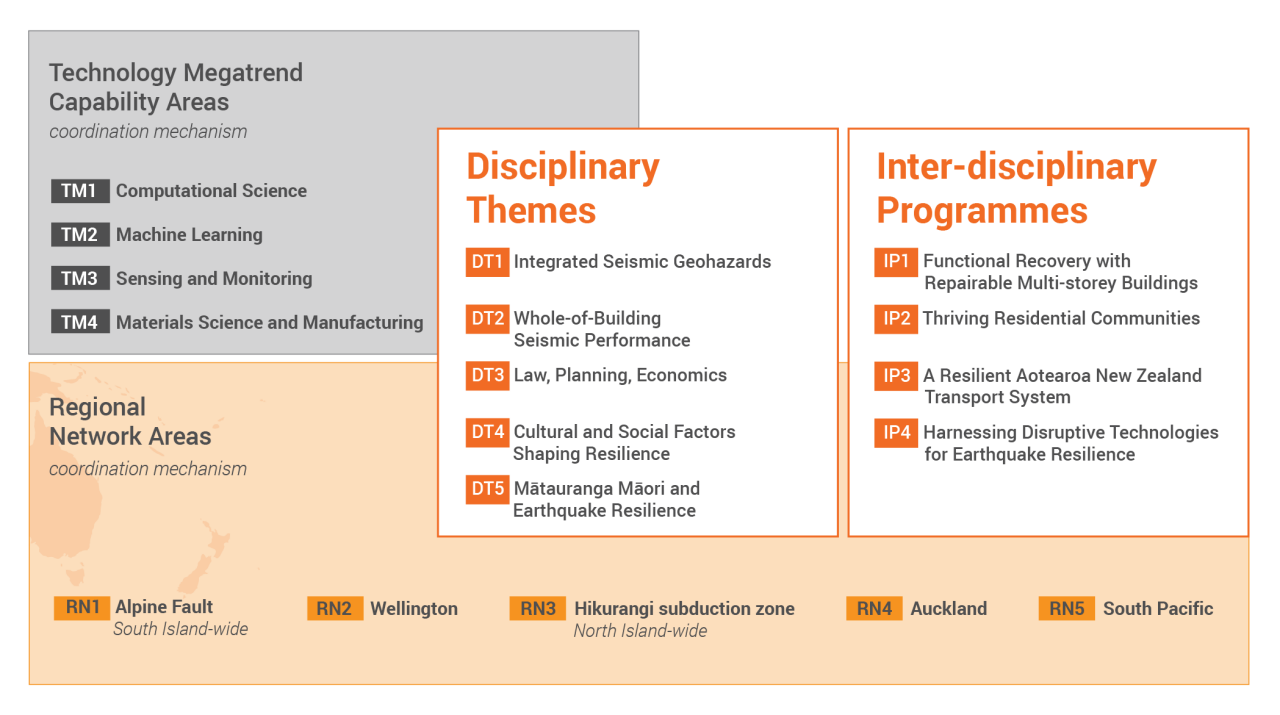About Us
QuakeCoRE aims to establish and link multi-institutional national research programmes that are internationally networked. The research programmes will advance the science and implementation pathways of earthquake resilience through system-level science with highly integrated collaborations coordinated across the physical, engineering and social sciences and relevant research institutions. Our research is organised into Disciplinary Themes, Inter-disciplinary Programmes and the Coordination Mechanisms of Technology Megatrend Capability Areas and Regional Network Areas.
Our Vision
An earthquake-resilient Aotearoa New Zealand where thriving communities have the capacity to recover rapidly after major earthquakes through mitigation and pre-disaster preparation informed by internationally-leading research excellence.
Our Mission
Transform the earthquake resilience of communities and society through innovative world-class research, education of the next generation, and deep national and international collaborations using Aotearoa New Zealand as a natural earthquake laboratory.
Core Values
Reflecting the Code of Professional Standards and Ethics of the Royal Society of New Zealand, our core values include:
- Excellence: Undertake leading-edge research of world-class quality;
- Collaborative for NZ Inc: Work inclusively with researchers, industry and other stakeholders to address the Te Hiranga Rū QuakeCoRE Mission;
- Diversity, Respect, Trust: Diversity of cultures, views and opinions is our strength; collaborations occur in a respectful reciprocal manner to develop long-term trust and be a spokesperson for Te Hiranga Rū QuakeCoRE nationally and internationally;
- Open: Our community is a centre-without-walls that is open to all willing participants to leverage our scale toward achieving the Mission;
- Productive and influential: Through the nature and scale of our open community, achieve high productivity in leading-edge research and influence society through its translation to impact
Our Culture
In Te Hiranga Rū QuakeCoRE, we strive for excellence and delivering research for the benefit of Aotearoa New Zealand that is useful, useable and used. We are doing this by creating a national collaboratory, that promotes a stimulating, supportive and productive environment within which researchers, practitioners and policy makers can come together to address our common goal of improving resilience to earthquakes.unity.
Mātauranga Māori
Through partnership with key sectors of Te Ao Māori, Te Hiranga Rū QuakeCoRE research activities seek to develop and harness mātauranga Māori perspectives on earthquake resilience, to achieve the resilience aspirations of tangata whenua. Additionally, we have a focus on leading the development of initiatives that will nurture Te Hiranga Rū QuakeCoRE Māori researchers and students; foster understanding and competence in kaupapa, tikanga and Te Reo Māori; and provide pathways for Māori student-led research in earthquake resilience.
Diversity, Equity, Wellbeing and Inclusion
Equity and diversity are essential to academic excellence. We support and encourage the open exchange of ideas, freedom of thought and expression, and debate that is not influenced by gender, age, ethnicity or religion, both within Te Hiranga Rū QuakeCoRE and the communities we work within. Underpinning this is a research community that recognises the inherent worth of every person and group (both within and external to Te Hiranga Rū QuakeCoRE), that fosters inclusion, dignity, understanding, mutual respect, and embraces diversity.
Contact the Support Team (quakecore@canterbury.ac.nz) to be put in touch with the Diversity, Equity, Wellbeing and Inclusion (DEWI) committee.
Research Programme
Te Hiranga Rū QuakeCoRE aims to establish and link multi-institutional national research programmes that are internationally networked. The research programmes are advancing the science and implementation pathways of earthquake resilience through system-level science with highly integrated collaborations coordinated across the physical, engineering and social sciences and relevant research institutions.


